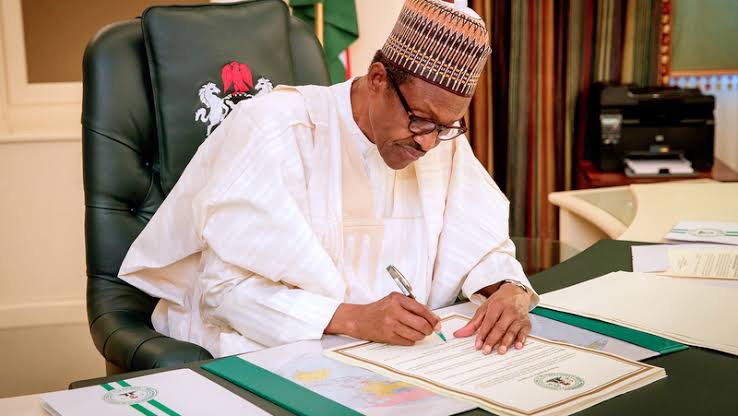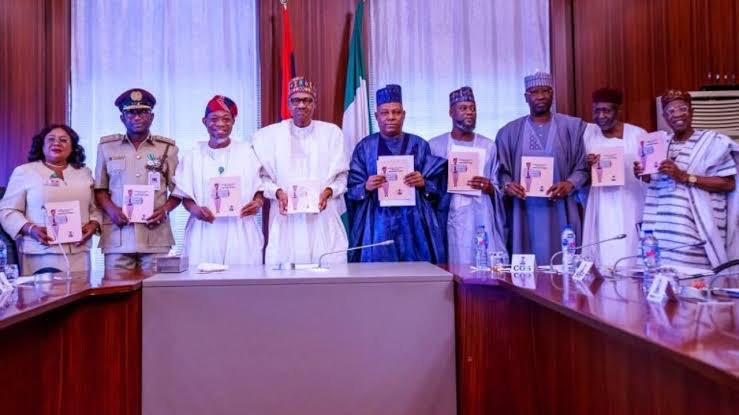Four years after former President Muhammadu Buhari launched Nigeria’s visa-on-arrival (VoA) policy, the process of obtaining it has remained difficult, stifling investors interested in tapping opportunities in Africa’s most populous nation.
Checks show that while other African countries charge between $40 to $100 for a visa on arrival, Nigeria charges over $200.
Some applicants are denied visas despite fulfilling all requirements put in place by the Nigeria Immigration Service (NIS). For those whose visas are approved, they often face delays in getting approval forms and some miss their dates of travel.

In addition to these, the processes of payments, obtaining receipt for payments and online approvals is also challenging as applicants have recently complained that the technology that supports the application system faces hitches that have been left unresolved.
Most times, applicants who have made payments online and received receipts do not get approval forms from the Nigeria Immigration Service (NIS). Some airlines do not allow these applicants to board the flights, as the application form is one of the requirements to fly into Nigeria.
Olúwatósìn Olaseinde, founder of Money Africa and Ladda, a financial literacy and investment platform, recently posted via her X (formally Twitter) handle that she was in a group where a multinational was hosting a conference in Abuja and saw how non-Nigerians were struggling with getting visas to attend.
“It never dawned on me that people also struggle to get our visas,” Olaseinde said.

Olaseinde’s comment on her X handle has since generated several reactions with people sharing similar experiences.
Jason Marshall, an American with X handle @__JasonMarshall, stated that “Nigerian visa is one of the few visas in Africa where I needed an attorney to make it happen. In most of African it is easy for Americans.
“My wife wanted to join me on a work trip but because the Naija visa is so hard she came with me to Ghana.”
He went on to state that a country that desperately needs dollars and foreign direct investments shouldn’t make it hard for people from the world’s largest economies to enter.
Emmanuel Okoegwale, with X handle @e_okoegwale, stated that the visa issues in Nigeria are a sad reality.
Okoegwale disclosed that some years back, he had a conference guest on VoA from France to Nigeria.
“He flew first to Cameroon before coming to Nigeria. He was detained for three days because he came via 3rd country for three days. I got an attorney for him, paid fine and he was deported. I wept,” he said.
Another X user, Mr Wick, with X handle @JardaniJovonovv said, “My uncle who lived in the US most of his life had to come get a passport with his foreign wife because getting a Nigerian visa was hard and so expensive. It was cheaper to just get a Nigerian passport.”
Makarios, a Zimbabwean with X handle @MakariosGl, stated that the difficult process to get Nigerian visas is really unnecessary.
”I had to stay at Murtala Muhammed International Airport (MMIA) for four hours after arrival while the officials took their time to process the visa. I always think twice when visiting Nigeria,” he said.
“I won’t forget how a speaker at our event (where I worked) was sent back to Belgium immediately after touch down, due to naija visa issues. The staff who went to pick him at the airport didn’t even get to see him. Nigerian visa is hard to get,” a X user with handle @ isiihenyen stated.
Several other statements generated from the comment confirmed how difficult it is to get Nigerian visas.
Ikechi Uko, travel expert and organiser of Akwaaba African Travel Market and Calabar carnival, an event that gathers tourists from various parts of the world, said the first barrier with Nigeria is visa, adding that the country has not figured out how to make itself a destination.
“The government issued a statement in 2018-2019, saying Nigeria would issue VoA. That was badly done, I can tell you. It was not properly done. Even at that, as we are now mastering it and improving on it, the government has just added the first $90 biometric charge.
“So, if your visa was $25 before, it is now over $100. Then this year, the government has now changed the biometric to $190. There is no visa you pay for coming to Nigeria that is less than $200. Why would you be charging fellow Africans $200 in this economy just for a visa? That is terrible,” Uko said.
He further said European countries discourage migration by charging high visa fees, so it is wrong for Nigeria to charge fellow African countries high visa fees.
Ikechi also complained that the VoA technology platform often experiences hitches with slow visa application process.
Susan Akporaiye, former president National Association of Nigerian Travel Agencies (NANTA), said that when she was still NANTA president, she and her team visited the immigration office to have a conversation with them on how to make visa processing seamless.
Akporaiye said the implication of having a difficult visa on arrival process is that it does not encourage investors to come into Nigeria because they are supposed to come and spend their money and should not face hassles doing that.
“Visa issues are very bad for tourism. This is what is happening to South Africa now. The next time South Africa will look at record on their tourism, they will realise a massive reduction from Nigeria. It does not help travel and tourism at all and that is why some of the events I had in South Africa, I had to move them to other countries because of visa issues.
“The same thing will happen to Nigeria if our visa process continues to be very difficult. People will be forced to move their programmes away from Nigeria,” she said.
The former NANTA president however explained that since the introduction of VoA, visa processing has been a lot better than it used to be.
She said it is important that people first find out if they are qualified for a visa on arrival before applying.
“If your country qualifies for a VoA, there is no need to stress yourself. Since the introduction of VoA, what I do is to just check the status and if a client qualifies for VoA, I let them know.
“If any person is still having issues, then maybe the person does not qualify for visa on arrival,” she explained.
The visa policy of 2020 expanded Nigeria’s visa from six categories to 79.
The NIS had explained that the current type of visa classes, which are Transit, Tourist, Business, Subject to Regularisation (STR), Temporary Work Permit (TWP) and Diplomatic, had their limitations.
Seyi Adewale, chief executive officer of Mainstream Cargo Limited, told BusinessDay that many countries are relaxing visa restrictions in order to boost the profiles of their respective countries.
Adewale said many countries are seeking new ways to attract and boost their tourism and provide opportunities to procure citizenship via innovative investment channels.
He said restricting visas is synonymous to limiting new foreign exchange inflows into the economy.
“Foreigners are the principal boosters for any nation’s travel and tourism. They in fact boost a whole economy in respect of culture and traditions as these are exotic niceties to them (watching cultural troops dance for example) that may collectively influence the choice of conferences, seminars, sport hosting or events, and fashion.
“There is an interesting development: we now notice tourists come into the Nigeria to perform religious rites such as Brazilians coming in to perform religious rites to ‘Obaluaye’ in Ogun State, Yemoja in Osun State, and Christian pilgrimage to the Synagogue, Redemption Camp, including end-of-the ear Experience, among others.
“Another point is allowing the youths to integrate or collaborate with their peers in movies, music, entertainment and other emerging sectors that are now a bulging catalyst to our GDP growth,” he said.
He said in recent times, the visa issuing process has been more open, transparent and direct, noting that the major issue is to enhance online processing of visas without the need to physically move to a location from where applicant is domiciled.
“For example, I recently travelled to Morocco and received visa within three days of desktop application. This is the way Nigeria should go, enhance, promote and adopt,” he added.
Olumide Ohunayo, director of research, Zenith Travels, commended the minister of interior for recent innovations in the industry such as improvements of the international passport issuance and facilitation at the airport.
Ohunayo, however, noted that visa facilitation is still lagging and should be improved upon to aid inbound and outbound tourism.
“There is a need to improve access to our visas and we need to reduce the cost of getting visas. These things have been hindering tourism and return travels for those who have visited Nigeria before.
“We may need to suspend reciprocity, maybe for this period, to encourage tourism. When it starts working, we can now start using reciprocity as a weapon. For the visa, I think we should go beyond the interview and stamping.
“We must move the visa processing to the e-visa stage. Most countries have moved to this stage, easing the process of processing the visas,” he added.
Olaitan Ibrahim